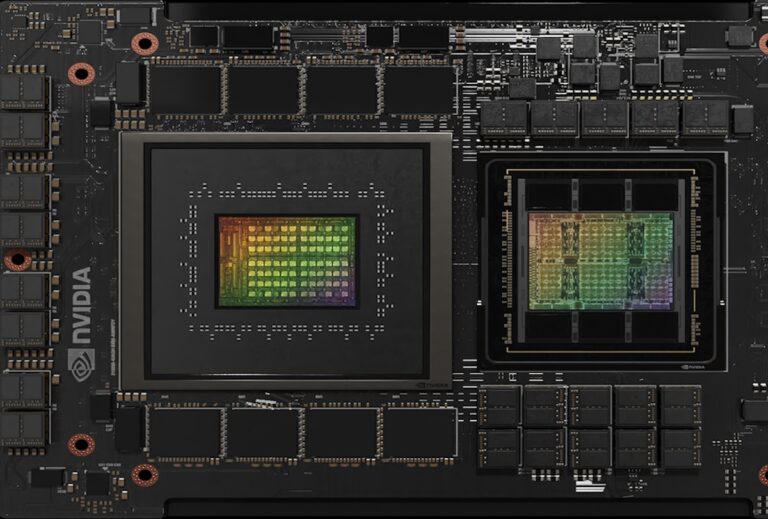Despite the U.S. ban on semiconductor exports, Chinese companies can still access Nvidia’s high-performance artificial intelligence (AI) chips by using cloud servers run by Google and Microsoft.
Microsoft is allowing Chinese customers to use Azure cloud servers located outside mainland China, The Information reported on Wednesday, citing employees at the US tech giant familiar with the service and a person with direct involvement in the sales.
Google has reportedly allowed Chinese customers to use its AI cloud services, and said it believed the arrangement complied with U.S. export regulations.
These cloud servers use Nvidia’s A100 and H100 processors, which are banned from being shipped to China by the US Department of Commerce after October 2022.
Nvidia, Microsoft and Alphabet did not immediately respond to Reuters requests for comment.
The Information’s report comes after OpenAI, the Microsoft-backed company that owns ChatGPT, stepped up customer location screening from July 9 to prevent users in mainland China, Hong Kong and Macau from using its AI chatbot via a virtual private network (VPN).
Since launching ChatGPT in November 2022, OpenAI has not provided services to Russia, China, Iran, or North Korea. People in Hong Kong and mainland China had to use ChatGPT via a VPN, but are now unable to connect.
“The United States is concerned that its cutting-edge generative AI technology will be used to improve the efficiency of Chinese industrial production,” a Guangdong-based reporter wrote in an article published on July 2.
“Over the past year and a half, as ChatGPT was being rolled out to users around the world, China had already mastered the principles and architecture of the core AI technology and launched its own chatbots,” he said.
Chinese companies will likely turn to using local chatbots because they can’t currently use ChatGPT, he said, a trend that will help China build a local AI ecosystem.
The Global Times reported on July 13 that Alibaba, Tencent, and Baidu have recently announced various packages to attract Chinese companies to migrate ChatGPT’s AI models to their platforms.
The Financial Times reported on July 4 that Alibaba, Tencent, Baidu, and ByteDance have recently purchased additional NVIDIA H20 chips for chatbots. According to the paper, NVIDIA’s H20 chip sales in China could reach 1 million units this year, worth $12 billion. The H20, made for the Chinese market, is a downgraded version of the H100.
Know your customers
The Wall Street Journal reported in July 2023 that the Commerce Department was preparing to ban U.S. companies from providing cloud services that use advanced AI chips to Chinese customers. The department wanted to close a loophole that had allowed Chinese companies to get around the chip export ban.
Also last July, U.S. Representative Jeff Jackson introduced a bipartisan bill called the “Closing the Foreign Use and Development of AI Loopholes (Cloud AI) Act.”
“The Commerce Department’s export restrictions were an important step in protecting American AI innovation, but we cannot allow China to circumvent the rules,” he said. “We must ensure that the Chinese Communist Party cannot use American technology to strengthen its military or develop new technologies to oppress groups like the Uighurs.”
However, progress on legislation has been slow because the issue involves third countries. There are no provisions prohibiting the overseas bases of Chinese companies from using U.S. AI cloud services, nor are there any provisions prohibiting U.S. companies from providing AI cloud services to Chinese companies in third countries.
On January 29th of this year, U.S. Secretary of Commerce Gina Raimondo proposed new regulations that would require U.S. Infrastructure as a Service (IaaS) providers to verify the identities of their international customers and approve special measures to prevent malicious overseas cyber actors from using U.S. IaaS products. IaaS is a type of on-demand cloud computing service, typically provided on a pay-per-use basis.
In an interview with Reuters, Raimondo said the proposed “know your customer” regulations were an important step to prevent China from using U.S. technology to train its own AI models.
The practice of “know your customer” (KYC) has been in place in the banking industry for decades, as government agencies sought to curb money laundering. Financial institutions, law firms, and accounting firms have a responsibility to ensure that their clients’ transactions are not involved in financial crimes.
Last month, The Information reported that two U.S. cloud providers had rejected offers to allow ByteDance and China Telecom to use their cloud servers because they knew the deals would violate the spirit of the U.S. semiconductor export embargo.
But the report said ByteDance still uses Oracle’s cloud services, which use the H100 chip, to train its AI models. A former Nvidia employee said it would be difficult for the U.S. government to block the AI models from being exported to China once they’re developed.
Read: Chinese heritage chips targeted by EU
Follow Jeff Pao at @jeffpao3 on X

